If I had to come back to life again, I'd like to be a ballplayer.
Lawrence Peter Berra was born in St. Louis, Missouri. His parents and two older brothers were born in Italy. His father worked in a brickyard and had little use for sports and games, but the Berra brothers, like their neighbors in the district known as the Hill, were soon captivated by American baseball and spent every day they could in the neighborhood sandlot. By age 14, Berra was playing in a youth league sponsored by the American Legion. His teammates gave him the nickname he was to make famous.
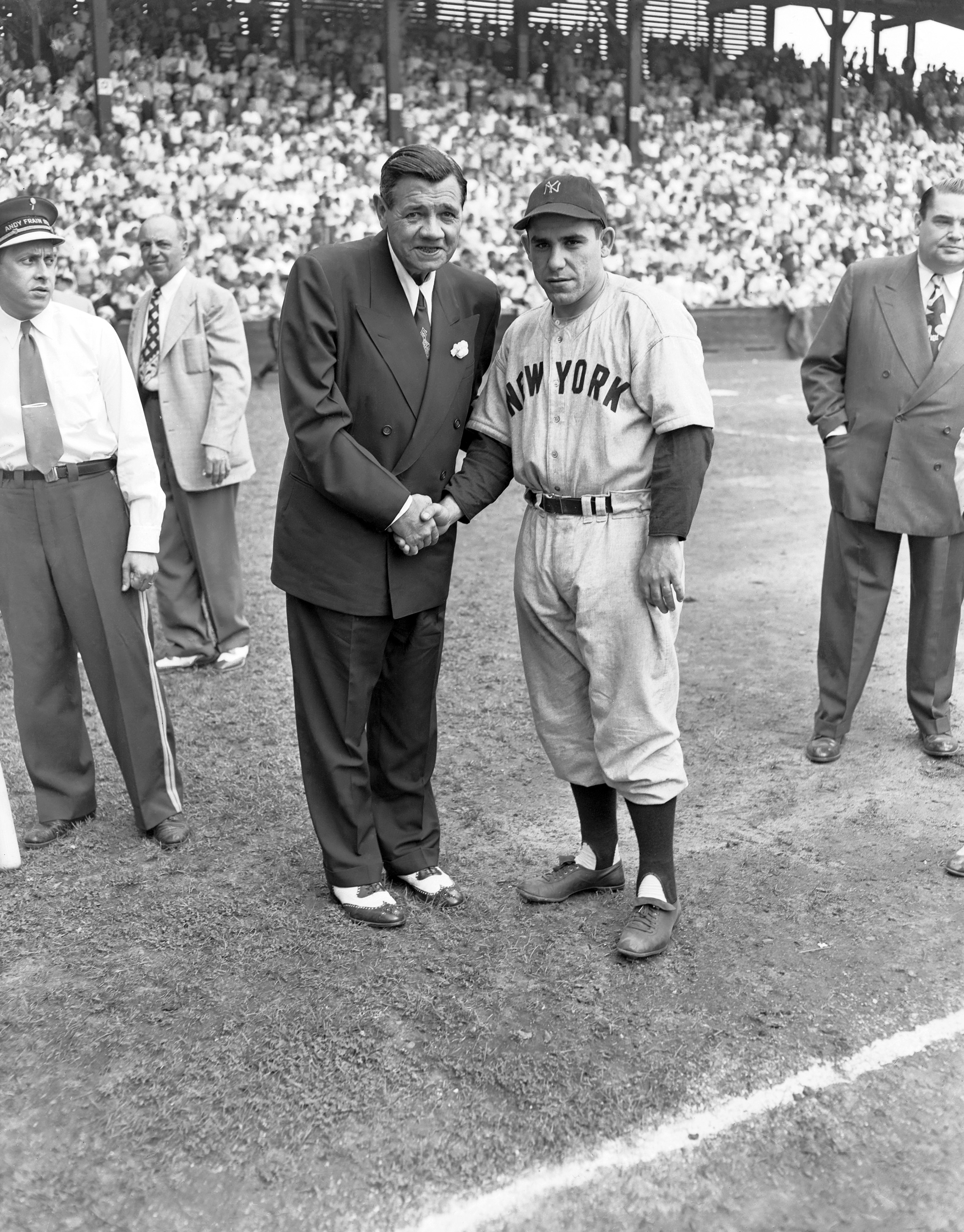
The manager of his team saw professional potential in Berra, and drew him to the attention of Branch Rickey, then the general manager of the St Louis Cardinals. Rickey was more impressed with Berra’s teammate, Joe Garagiola, and offered Garagiola $500 a week to sign with the Cardinals. He offered Berra half the sum, and reportedly observed that Berra would never be more than a Triple A player, not good enough for the major leagues. Berra refused to take less than Rickey was offering Garagiola, and turned him down. Shortly thereafter, Rickey moved from the Cardinals to the Brooklyn Dodgers and finally offered Berra the $500 a week he had insisted on, but by then Berra had accepted an equivalent offer from the New York Yankees. Berra would remain associated with the Yankees for most of his career. At first he was assigned to the Norfolk Tars farm team, in the Class B Piedmont league. The 17-year-old Berra immediately showed signs of his talent as a hitter by driving in 23 runs in a single game.

Before Berra could make good on his promise, he came of age for military service. With World War II raging, Berra volunteered for the United States Navy. He served in North Africa and Europe, participating in the D-Day landing in Normandy. He continued to play baseball in the Navy after his reassignment to the United States. Not long after his discharge from the military, Berra was assigned to the Yankees’ New London, Connecticut club. There, Mel Ott, General Manager of the New York Giants, offered the Yankees $50,000 for Berra’s contract. The Yankees’ General Manager, Douglas McPhail, immediately took a closer look at Berra and moved him to the Newark Bears of the International League in 1946. That autumn, he was promoted to the major league New York Yankees. Berra was to play with the Yankees for the next 17 seasons.
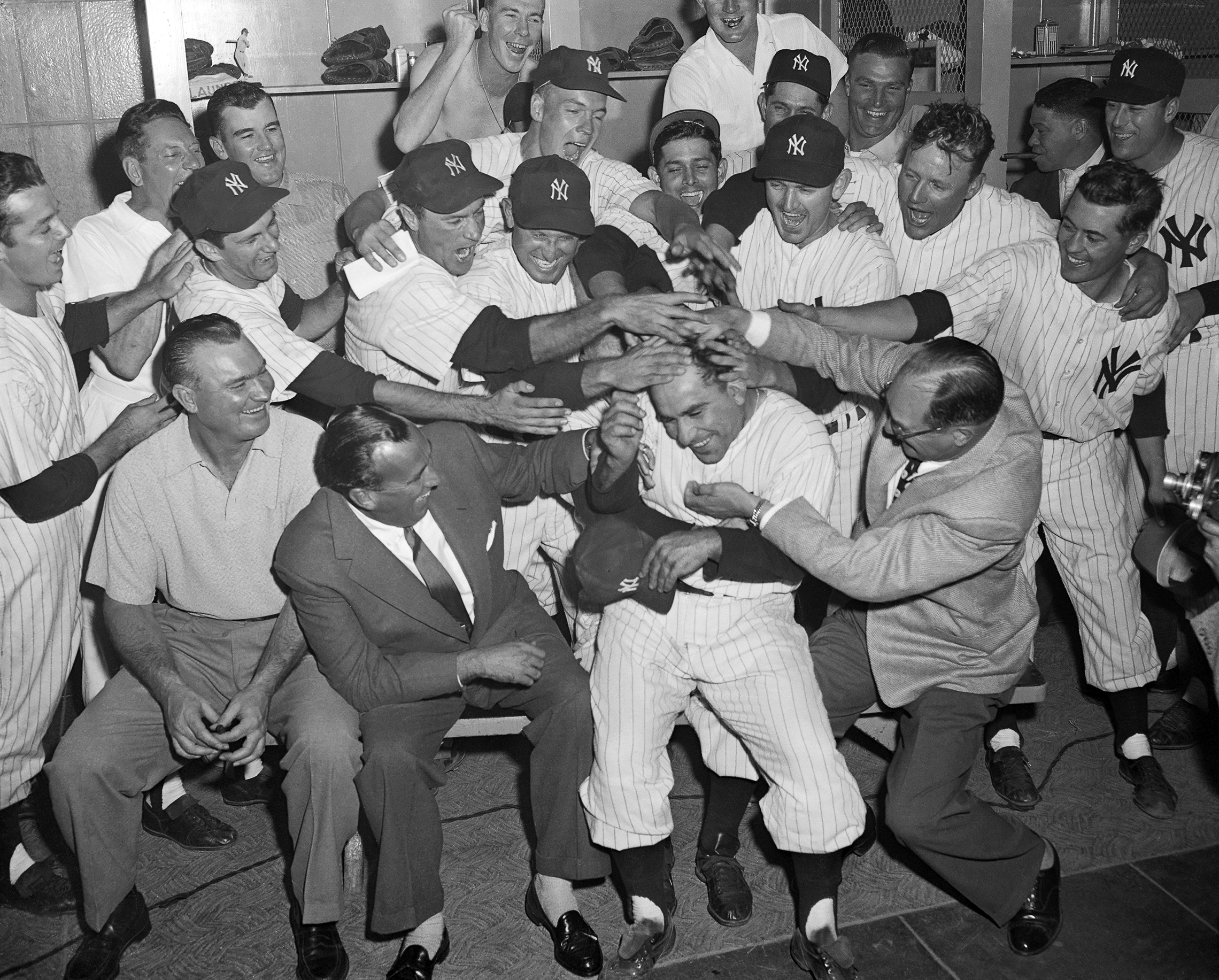
The Yankees made Berra a catcher, a position he had seldom played before. He found the transition to a new position difficult at first, but in time he would become the most celebrated catcher of the era. He made a more immediate impression as a hitter. In 1947, he set the first of his many World Series records, as the first pinch hitter to score a home run in World Series play. He soon became famous for swinging at seemingly impossible pitches. “If I can see it, I can hit it,” he explained. Pitchers found him almost impossible to strike out. In the 1950 season, he only struck out 12 times in 597 times at bat.
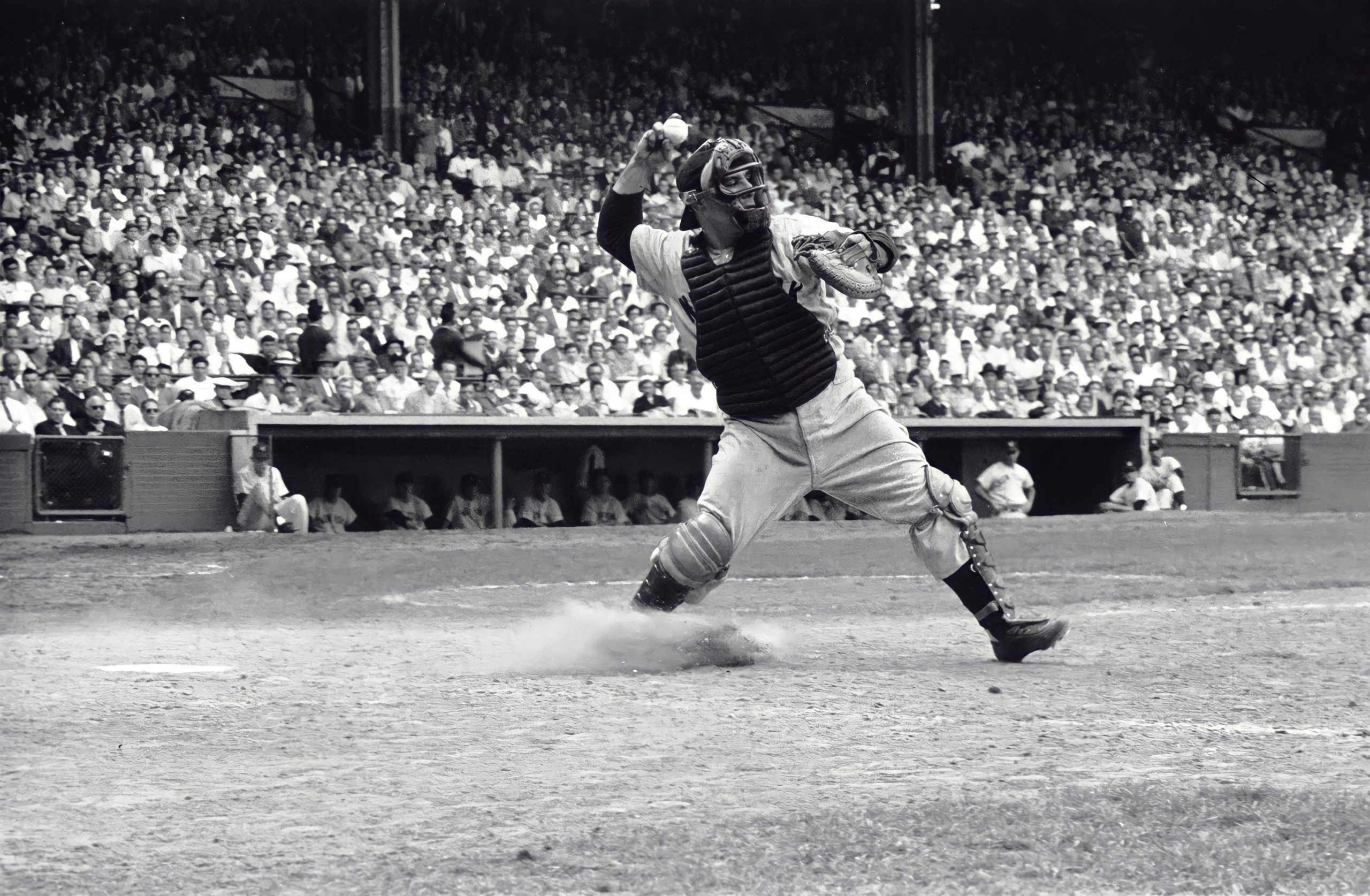
Berra’s ebullient personality made him a favorite of fans and sportswriters, who delighted in his trademark aphorisms, the so-called Yogi-isms that made him the most-quoted athlete in history. “It ain’t over ’til it’s over,” “It’s déjà vu all over again,” and “You can observe a lot just by watching,” may sound like artless redundancies at first hearing, but they encapsulate attitudes of optimism and common sense that Americans admire in their heroes and strive for in themselves.
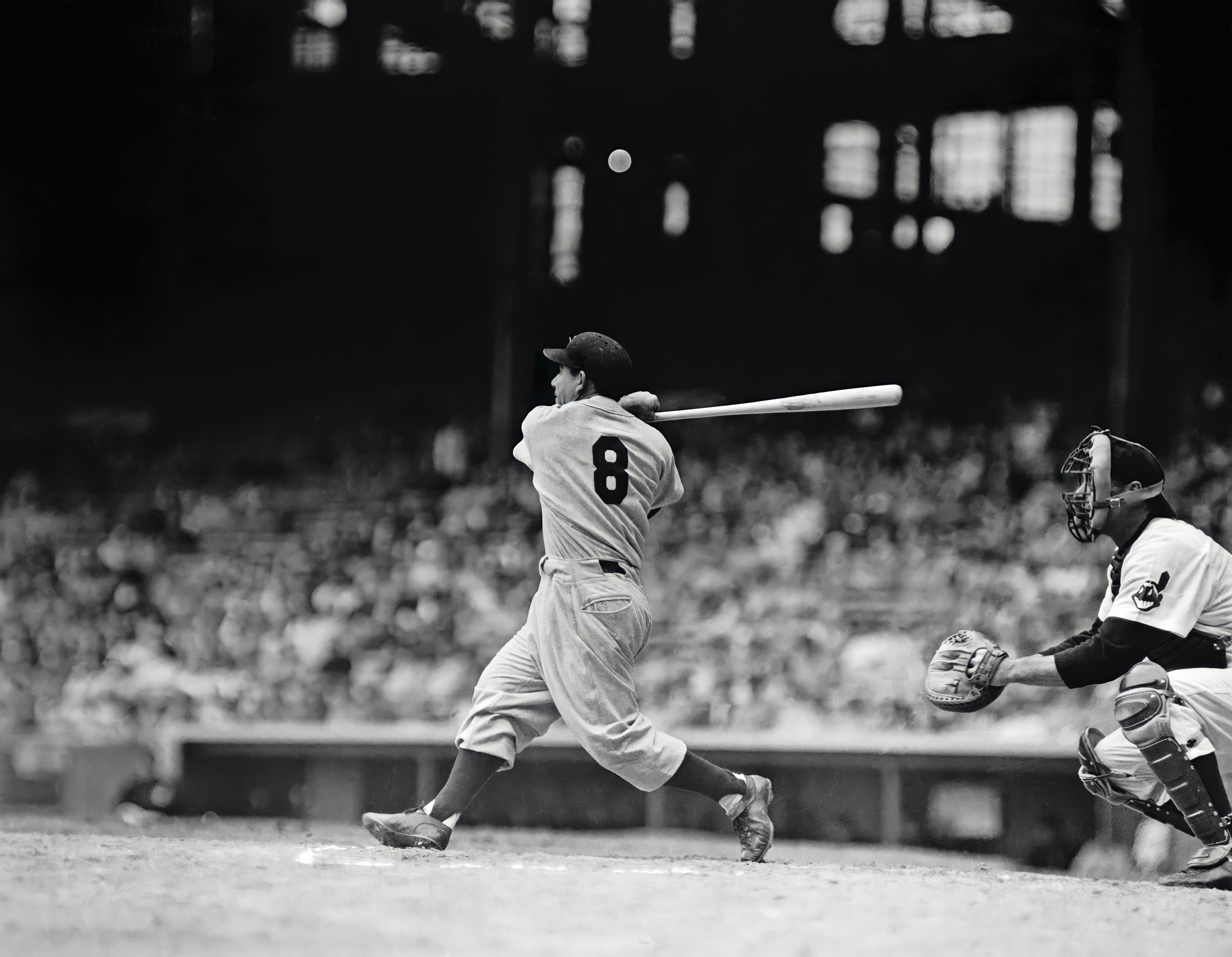
While Berra was on the team, the New York Yankees won 14 American League championships, and triumphed ten times in the World Series, unequaled records for a player in either major league. He holds World Series records for most games played by a catcher, most times at-bat, most hits, and most doubles. Only two players in the history of the game have scored more home runs in World Series play. Among other records as a catcher in the regular season, he played 148 consecutive games without an error. Berra played in 15 All-Star games, and was named Most Valuable Player in the American League in 1951, 1954 and 1955.

Berra played his last season as a Yankee in 1962. He became the Yankees’ manager in 1964, leading the team to victory in the American League pennant race that year, but losing to the Cardinals in a seven-game World Series. Berra was dismissed, and for the first time in his major league career was no longer a New York Yankee. He remained in New York, however, signing on as a player-coach with the New York Mets in 1965, under his longtime friend and mentor, Casey Stengel. That season, Berra took to the field as a player for the last time, but he remained with the Mets’ coaching staff throughout the decade.
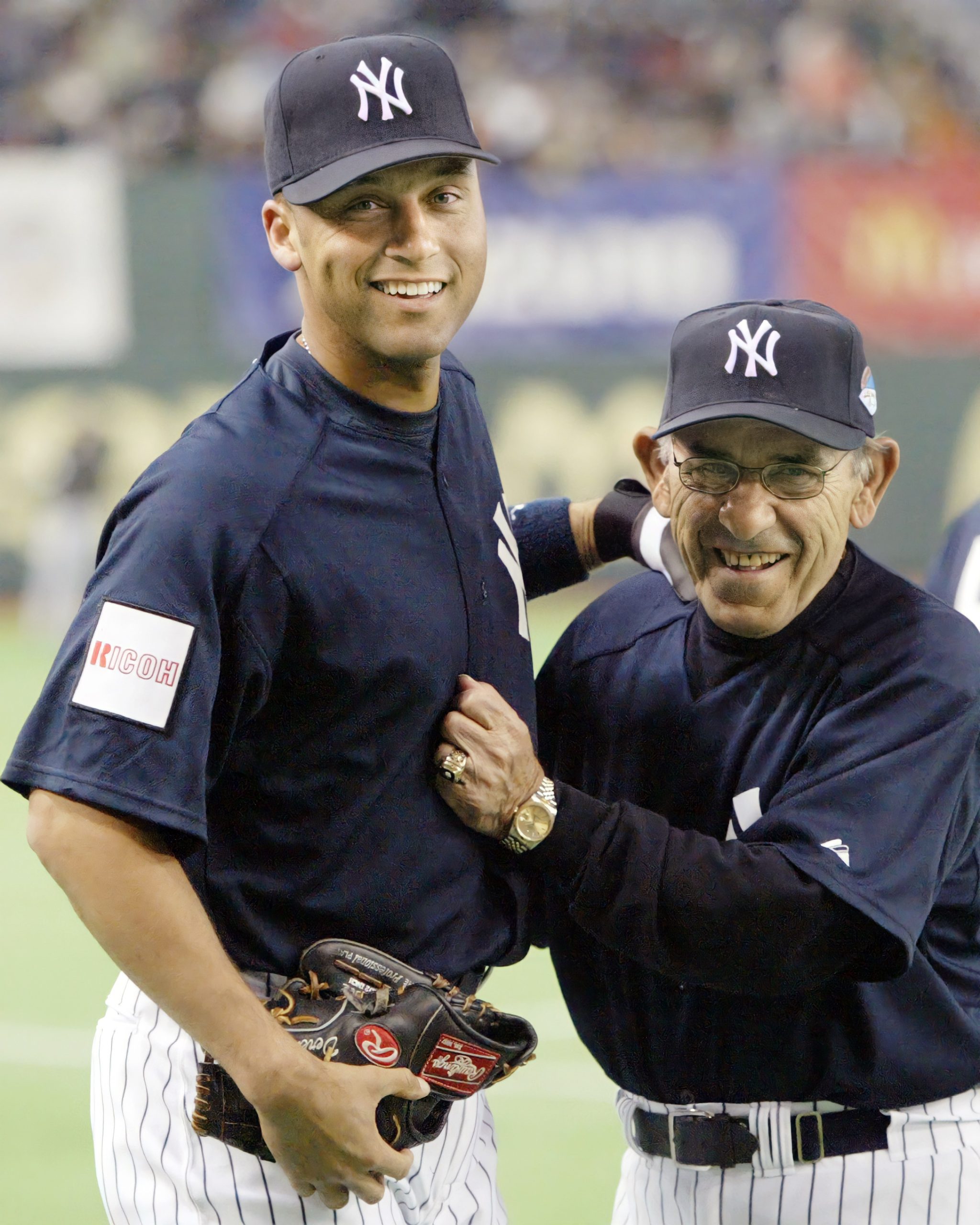
Berra became the manager of the Mets in 1972, the same year he was elected to the Baseball Hall of Fame. In the last month of the 1973 season, Berra led the Mets from last place to win a National League championship. He is one of the only managers in history to have won pennants in both the National and American Leagues. Yogi Berra returned to the Yankees as a coach in 1976, and managed the team during the 1984 and 1985 seasons. He then coached the Houston Astros from 1986 until his retirement in 1992.
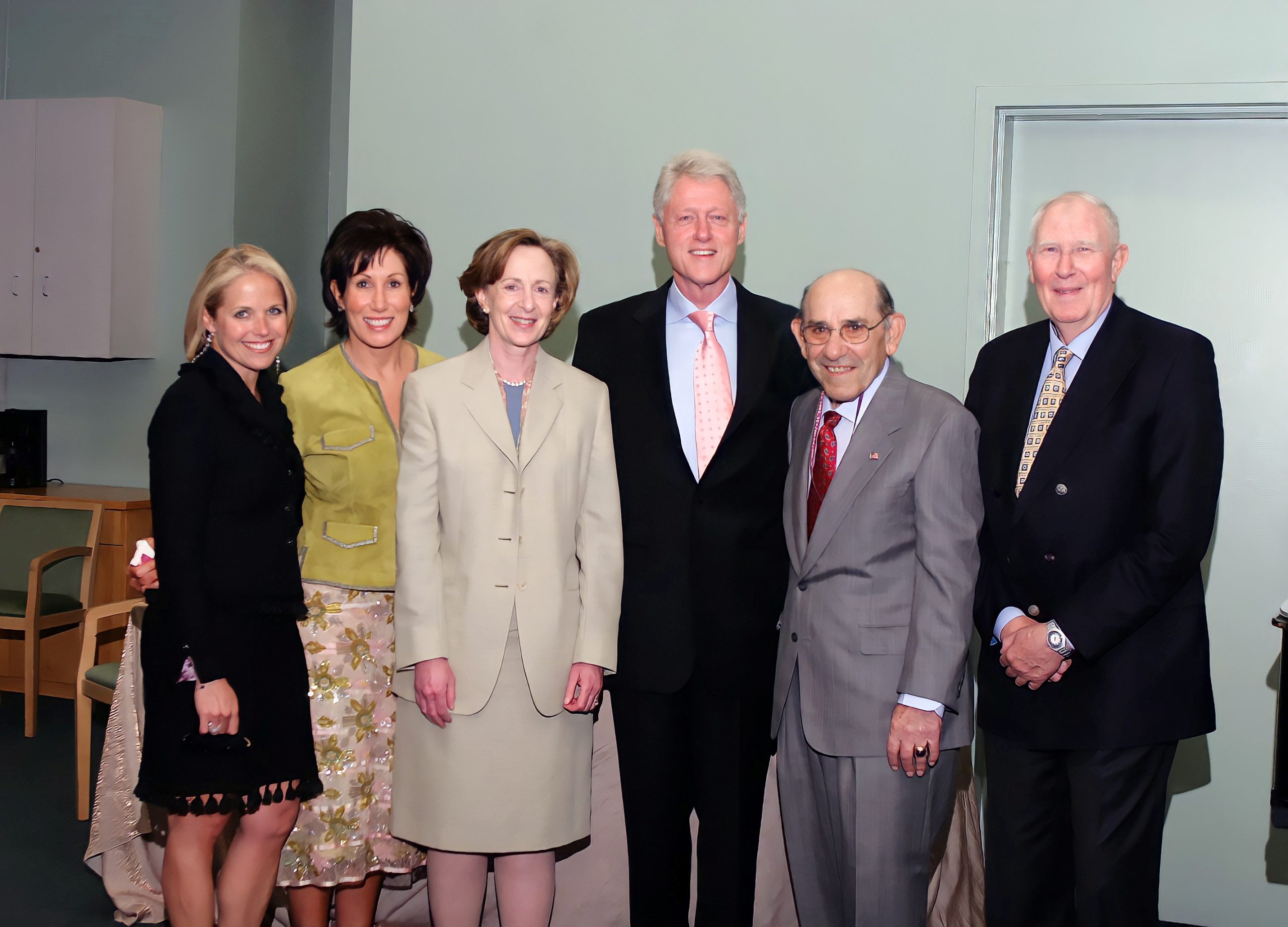
In 1998, the Yogi Berra Museum and Learning Center opened its doors at Monclair State University in New Jersey. In the words of its mission statement, the museum was founded “…to preserve and promote the values of respect, sportsmanship, social justice and excellence.” These are qualities Yogi Berra exemplified throughout his career. The Yogi Berra Museum ensures that future generations will be inspired by the talent and determination of a legendary athlete, and the warmth and wisdom of an American hero. In 2015, shortly after his death at the age of 90, Yogi Berra was posthumously awarded the Presidential Medal of Freedom, the nation’s highest civilian honor.

There is no more beloved figure in the history of America’s national pastime than Lawrence Peter “Yogi” Berra. One of the greatest catchers and clutch hitters in the history of baseball, he was the anchor of the great New York Yankees dynasty from the late 1940s to early ’60s.
Berra played on more pennant-winning teams (14), and on more World Series winners (10) than any player in the history of the game. A 15-time All Star, he was named Most Valuable Player in the American League three times, an unsurpassed accomplishment. He also set numerous records for catchers, including 148 consecutive games without an error. He was elected to the Hall of Fame in 1972 and is a member of Major League Baseball’s All-Century Team. As a manager, he won pennants for both the Yankees in 1964 and the Mets in 1973.
His trademark “Yogi-isms,” such as “It ain’t over ’til it’s over” and “It’s déjà vu all over again,” have become part of the American vernacular. No other sports figure has as many entries in Bartlett’s Familiar Quotations. After retiring from baseball he selflessly devoted himself to charitable causes, raising over $1 million for scholarships, educational programming and special-needs scouts through his annual golf tournament.
What was it like growing up on the Hill in St. Louis when you were a kid?
Yogi Berra: Well, it was very nice. In fact…
We played ball all the time. I played every sport there was in St. Louis. Not basketball, I was too short. I played a lot of soccer. I played football. I played softball. And, we had a game called “cartball.” Did you ever play with bottle caps? We played with bottle caps, with broomsticks. Softball, everything. I played every sport. I actually didn’t know I liked to play baseball until I was 14.
Did you do anything besides play sports?
Yogi Berra: Oh yeah. I went to school, and I got out of school, and I went to work. I had to get a working permit.
What about school? Were you a good student?
Yogi Berra: No. Not too good. You see, I break up the English a little bit. I don’t mean to do it, but it just comes out that way.
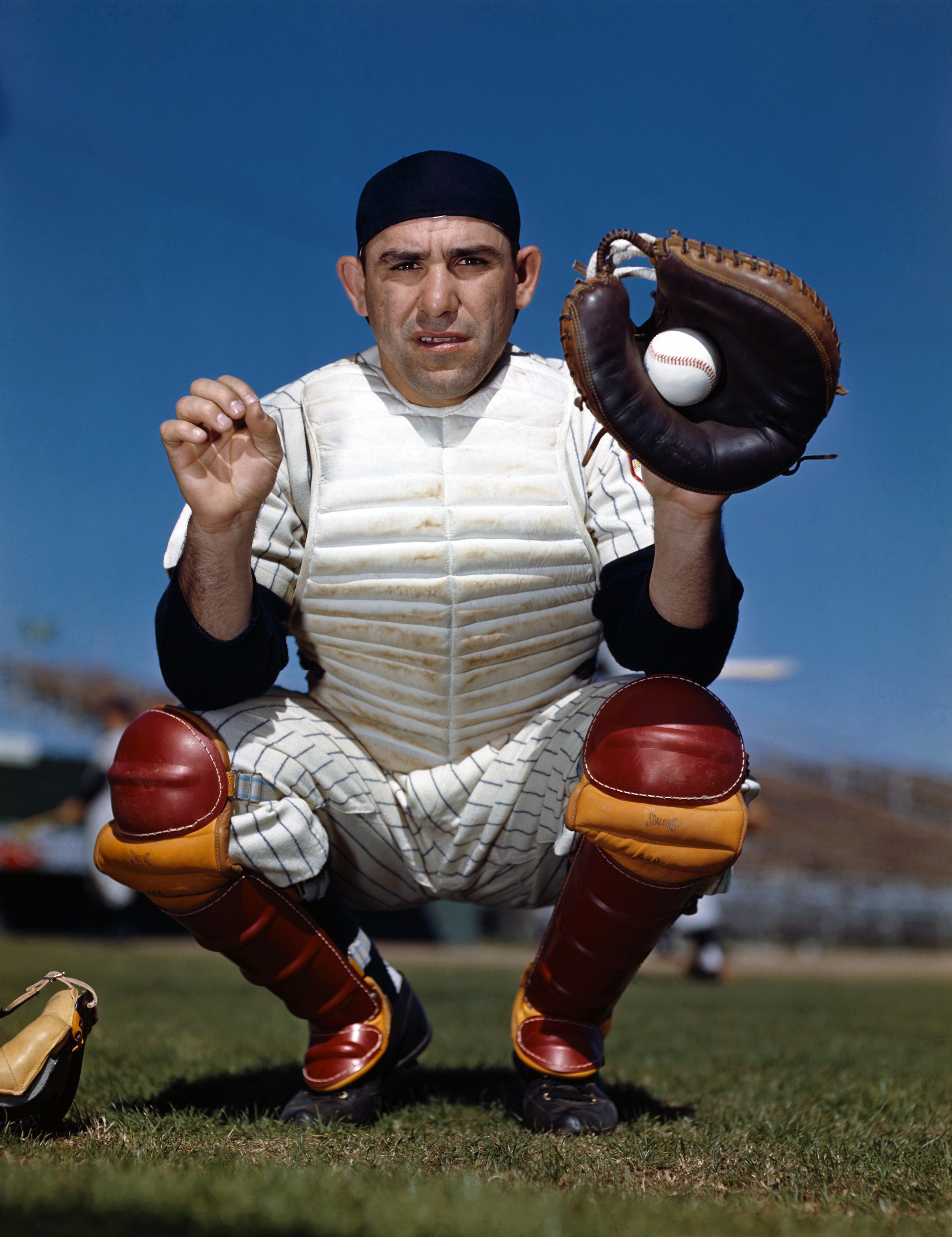
What was your favorite thing about school?
Yogi Berra: When you had recess and could play a little softball.
Were you a tough kid?
Yogi Berra: No, I’m not that tough. I could take care of myself if I have to.
When you were growing up, did you have to take care of yourself?
Yogi Berra: Well, I took a little boxing lessons. I had fought in the clubs and the whole thing. I fought a little. I liked the sports. I love to watch sports right now. I love to watch hockey, I like football. Basketball? I’m not much of a fan. I admit that. I watch it, but I’m not much of a fan because I wasn’t that good at basketball.

Why did you choose baseball?
Yogi Berra: Baseball? Where could you go and work three hours and make that kind of money? It’s just like Whitey Ford said. You know, they asked me, “What would you have done if you hadn’t been a baseball player?” “Work in a shoe factory.” They asked Whitey Ford, “What would you do?” “I’d probably be a bartender,” he says.
Thousands of kids dream of playing big-league baseball and never make it. You made it. How were you able to do that?
Yogi Berra: Well, it’s not an easy game. You got to stay at it. You really do. You know, a lot of people just think — we had guys — kids today, they’re organized today. We weren’t organized. Like you and I, you pitch to me, and I’d throw to you after. And, like I said, that cartball taught me a lot, softball. You got to keep your eye — you can’t swing hard in softball, that’s another thing. I never swung. If I swung hard, I would swing and miss a lot. And, you play with bottle caps, that ain’t gonna make you swing hard, neither. And one strike, you were out. And you had to get four hits before you get a run. And we played it day and night. We loved it. Whatever was in season. I played a lot of soccer. I love soccer. I love to watch soccer games on TV. And back there on the Hill, we played against — soccer, we had Spanish living there, the Italians and Germans and Irish. We played against each other. And, I used to enjoy it. That was good. That’s a good conditioning game, that soccer. It is.
What about your family? Tell us about your father and your family.
Yogi Berra: My father came over first. He came from the old country. And he didn’t know what baseball was. He was ready to go to work. And then I had three other brothers and a sister. My brother and my mother came over later on. My two oldest brothers, they were born there — Mike and Tony. John and I and my sister Josie were born in St. Louis. My father believed in working. You know, bring that check home! At that time, it was the Depression and everything, and he didn’t know what baseball was. And if I ever came home with dirty pants, I really caught a beating. But that’s funny.
I got started around 14. I worked in a shoe factory at 14. I had to get a working permit to work there. My brother Mike worked there too, and I used to go into work with him at 14. And then, I got a chance to play American Legion ball. I kind of skipped work a little bit, and I started to play. At 15 and 16, I played American Legion ball. And, I said, “I’m going to play in the big leagues one of these days.”
Did you ever want to be anything else but a ballplayer?
Yogi Berra: No. I loved baseball. I loved it. I still love it.
What did your father think of that?
Yogi Berra: He didn’t think nothing about that. “You go to work and bring that check home!” Like in the old country.
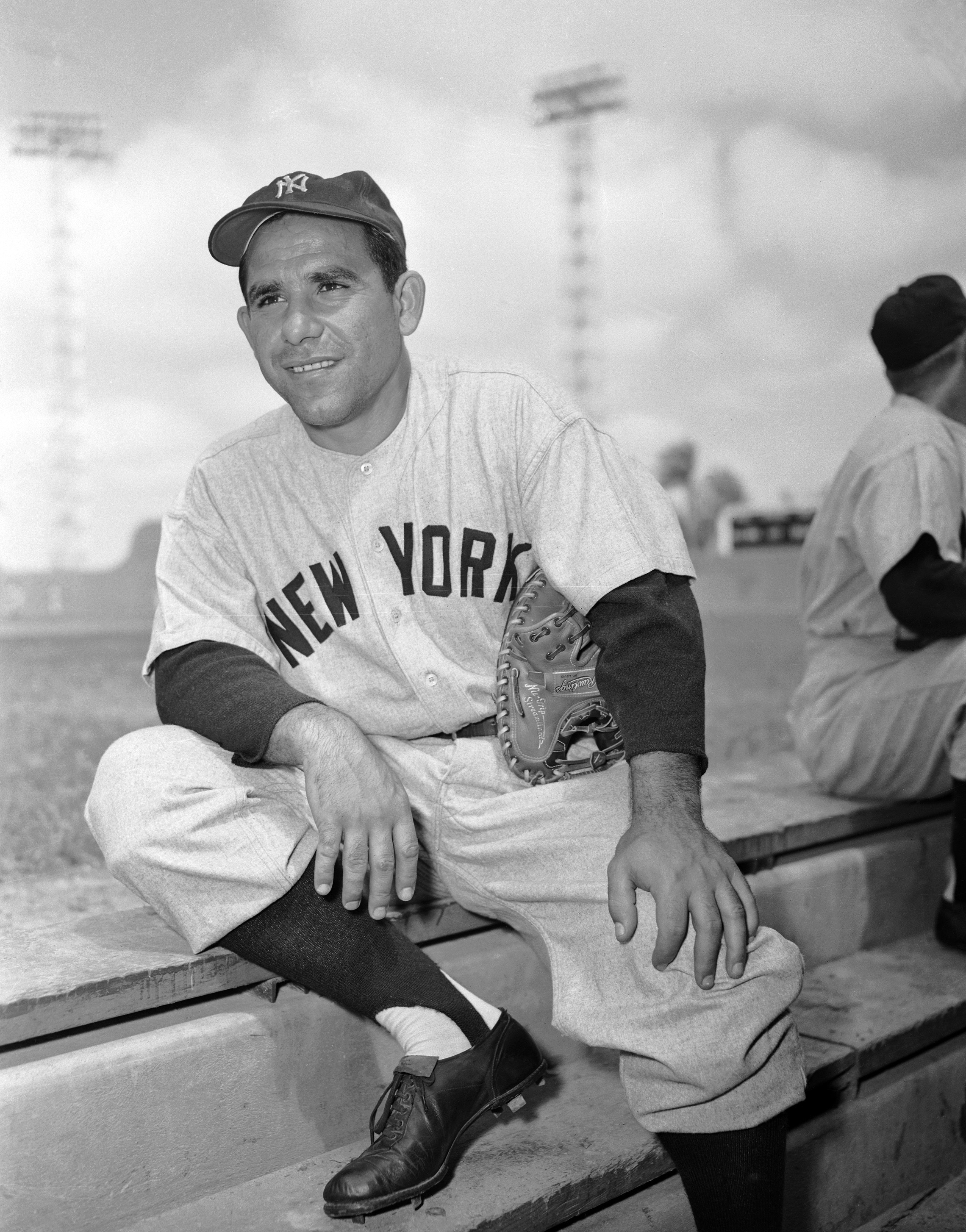
How did your father earn a living?
Yogi Berra: Worked in a brickyard. My brother Tony worked with a baker. Mike worked in a shoe factory. My brother John was a waiter.
The 5-foot, 8-inch son of an Italian immigrant, you grew up to reach the Hall of Fame? What made you think you could do this?
Yogi Berra: I didn’t think I could. Not actually that.
I’m very happy about it. You know, a kid from the Hill being elected to the Hall of Fame. Proud of it. And actually, I could tell you something else. My brother Tony was the best ballplayer in the family. My dad wouldn’t let him go. And, I always kidded my dad, I said, “See that, Pops? You let all your sons go, you’d have been a millionaire.” He said, “Blame your mother.”
He was a tough man, but he’d treat you right. When I’d go out at night, he’d say, “What time are you coming home tonight?” He made me make the time. If you weren’t home at that time, you’d get it. That taught me discipline. I had to telephone.
We had clubs on the Hill, we played against each other. My brother Tony played semi-pro ball. My brother Mike played semi-pro ball. My brother John played semi-pro ball. But, they only played on Sundays. And us kids, we played every darned day, you know, because they had to go to work. They really — every chance they had. And, they’re the ones that taught my dad to go and play baseball. They said, “We’re all working, give…” They called me “Lawdies” then, instead of Yogi. Lawdies. “Give him a chance to go out and play ball.” And, he says, “Okay.”
So, I signed up. Leo Browne ran the American Legion team. See, I wanted to sign with the St. Louis Cardinals, either that, or the St. Louis Browns. I wanted to play for St. Louis. It’s home.

You were christened “Lawrence.” How did you get the nickname “Yogi?”
Yogi Berra: Playing American Legion ball.
You know who gave it to me? Bobby Hoffman, who played with the Giants. We played on the same American Legion team. And, you know, we didn’t have no dugouts when we played. We sat on the ground, or a bench was full with the players. And, I was sitting on the ground with my legs crossed and my arms crossed. And he says, “You look like a Yogi.” And that stuck.

Did you ever mind being called Yogi?
Yogi Berra: No. Not at all. It don’t bother me. A lot of guys called me different names. But we had our own nicknames on the Hill, anyhow, in St. Louis.
